
Had great experience in Clove Dental Clinic, Dr Kalpana did a great job, well experienced doctor and had great knowledge.
On this Page ↓
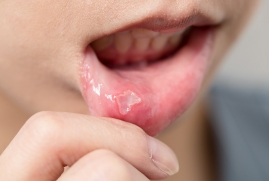
Mouth ulcers are typically small and painful lesions that develop in the oral cavity. They can appear in different forms at various locations, such as gums, tongue, inner cheeks, lips or even the roof of the mouth. Their occurrence is associated with discomfort while eating, drinking and speaking. They are usually red, yellow, or white in color; normally harmless; and self-healing in a week or two. But for most people, they are a great irritation.
Whereas the cause of mouth ulcers cannot be easily identified in most cases, some other causes include minor injuries, allergies, stress, nutritional deficiencies, and underlying diseases
This page will explore the symptoms, causes, and various treatment options available for managing mouth ulcers effectively.
There are several types of mouth sores and lesions, each with distinct characteristics:
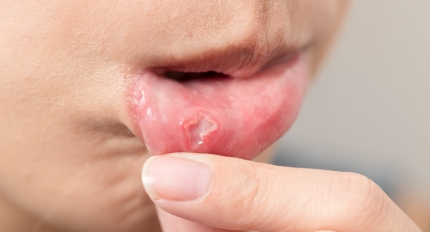
Canker sores (aphthous ulcers):

The most common type of mouth ulcers. They appear as white or yellow sores with red edges. While the exact cause is unknown, factors like minor trauma, acidic foods, and stress may trigger them.
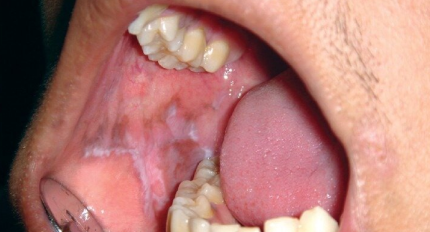
Oral lichen planus:
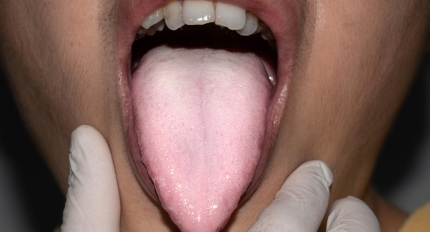
This condition causes itchy rashes and white, lace-like sores inside the mouth. It’s an immune system response, primarily affecting women and people assigned female at birth over 50.
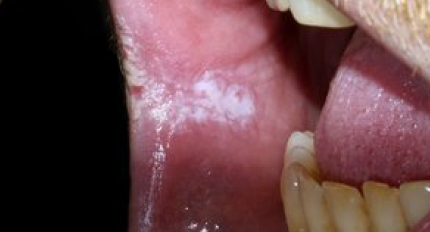
Leukoplakia:
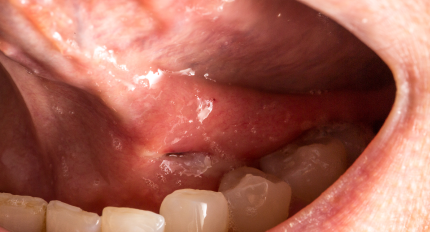
Characterized by white or gray patches inside the mouth, leukoplakia results from excess cell growth. It’s often associated with chronic irritation from tobacco use but can occur without an apparent cause. These lesions are usually non-cancerous.
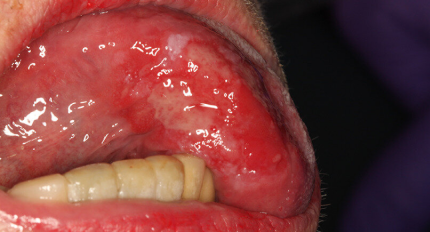
Erythroplakia:
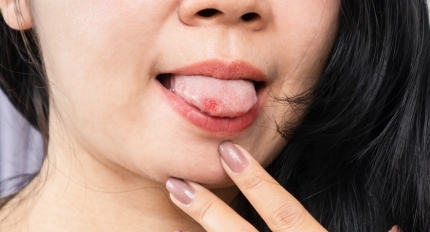
These are red patches appearing on the oral membrane, including tongue, inner cheeks or floor of mouth. Erythroplakia is often linked to tobacco use. Unlike leukoplakia, these patches are usually precancerous or cancerous.
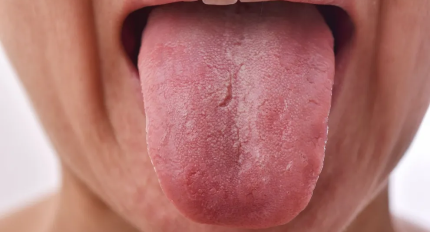
Oral thrush:
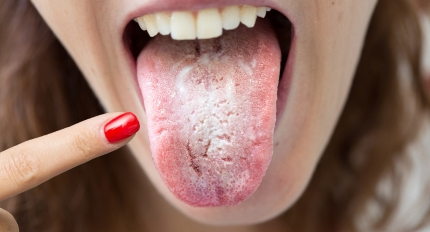
A fungal infection that is caused by the overgrowth of Candida Albicans. It presents itself as red and creamy white sores or patches in the mouth. Oral thrush is also seen to be occurring in relation with antibiotic treatments or weakened immune systems.
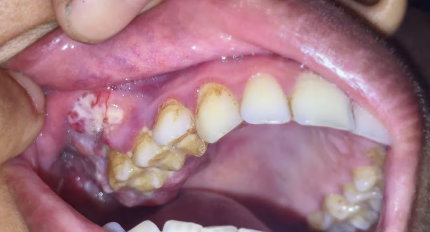
Mouth cancer:
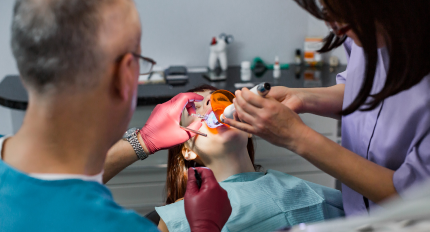
In a few cases, oral cancer manifests itself as persistent red or white mouth sores or ulcers that do not heal on their own. If any mouth ulcer is seen to be present over three weeks, it should be checked by a professional.
For Mouth ulcers it becomes difficult to at times understand their exact cause as various factors contribute to their development. Women, children and adolescents or ones with a family history of the condition are seen to be more prone to developing ulcers.
Common causes and risk factors include:
1. Physical trauma or injury:
2. Irritants and sensitivities:
3. Nutritional factors:
4. Hormonal changes:
5. Stress and lifestyle factors:
6. Infections:
7. Medications:
8. Underlying health conditions:
The majority of mild mouth ulcers are easily detectable and don’t need to be thoroughly investigated. But if you go to the doctor, the diagnosis usually entails the following steps:
Visual examination:
A basic clinical examination is typically sufficient for a healthcare provider to diagnose mouth ulcers. They will assess the lesions’ location, kind, and appearance.
Medical history:
While discussing your case history, your doctor will inquire about any possible triggers or related symptoms. Alongwith medical history the frequency, duration, and severity of your ulcers too helps understand the situation better.
Further investigations:
For severe, persistent, or numerous lesions, few more tests are suggested to understand the recurring cause, namely:
While most of the mouth ulcers are self healing and disappear within a few days to two weeks, it never hurts to understand their management. Various at home treatments are available that help reduce pain and discomfort, alongwith accelerating healing time and minimizing recurrences. If home remedies don’t help we also do have a list of over the counter medications that help while you seek help from a professional.
1. Topical applications:
2. Mouth rinses:
3. Natural remedies:
4. Nutritional supplements:
For severe, persistent, or frequently recurring mouth ulcers, a healthcare provider may prescribe:
1. Topical medications:
2. Oral medications (to be taken after consulting with a healthcare professional):
3. Mouth rinses:
4. Cauterization:
Mouth ulcers aren’t a big cause of concern, unless the occurrence becomes frequent, severe or long lasting, it is recommended to visit a professional for accurate diagnosis and prompt treatment.
While most mouth ulcers are harmless and heal on their own, certain situations warrant medical attention. You should consult a healthcare provider or dentist if you experience any of the following:
1. Persistent ulcers:
2. Unusual characteristics:
3. Severe symptoms:
4. Associated symptoms:
5. Frequent recurrence:
If you’re experiencing severe or frequent mouth ulcers, consider asking your doctor the following:
Remember, early intervention can help manage symptoms more effectively and identify any potential underlying issues. Don’t hesitate to seek medical advice if you’re concerned about your mouth ulcers.
Treatments for mouth ulcers should be carried out at its earliest stages to avoid extra expenses that might incur later if the situation goes unheeded. You need to contact the nearest Clove Dental clinic in India for the best prices.
Recurrent, or indeed persistent, mouth ulcers are a major symptom for many serious conditions. If you have recurrent or severe mouth ulcers, it is important to seek an appropriate diagnosis and treatment from your doctor or dentist.

Had great experience in Clove Dental Clinic, Dr Kalpana did a great job, well experienced doctor and had great knowledge.
Q.1.Do Mouth Ulcers Lead To Oral Cancer?
Oral cancers may lead to non healing painful mouth ulcers that persist for weeks. Although mouth ulcers appear anywhere in the mouth, those appearing beneath the tongue are one’s to look out for.
Q.2.How Are Mouth Sores Treated?
Mouth ulcers typically go better in a week. For at home treatment, drink lots of water and avoid hot foods. Also warm salt water rinses and antiseptic gel application have shown good results.
Q.3. How Long Does It Take To Heal Ulcers?
Mouth ulcers generally heal on their own in one to two weeks.
While severe and painful ulcers may not heal for up to six weeks. It is recommended to consult a dentist for quick relief from sores.
Q.4.Can One Apply Toothpaste To Ulcers?
Toothpastes treat mouth ulcers by reducing the swelling and pain of ulcers. But for ones who are prone to mouth ulcers, SLS toothpastes may aggravate ulcers. Hence it is recommended to seek help from a dentist nearby for painful and non self healing ulcers.
Q.5.How Can You Get Rid Of Mouth Ulcers Permanently?
A healthy diet and strict oral hygiene are the secrets to an ulcer-free mouth. Mouth ulcers can be caused due to underlying health reasons like Vitamin B12 deficiency and iron deficiency too. Patients prone to mouth ulcers must consult the best dentist near them for a permanent solution.
Q.6. How Long Do Canker Sores Last?
The healing period for Minor sores is 7-10 days, whereas major ones take up to 6 weeks to heal completely.
Q.7.What if My Canker Sore Isn’t Going Away?
When the canker sore doesn’t heal within 3 weeks, professional consultation shall be sought. Persistent sores could indicate an underlying health condition or may require medical assistance.
Q.8.How Do I Know If I Have a Traumatic ulcer?
Traumatic ulcers appear shortly after an injury to the mouth. It can be caused by activities such as biting your cheek or tongue, or irritation from dental work. They occur at the site of injury and heal within a few days when the source of trauma is removed.
Q.9.Can Cancer Cause Mouth Ulcers?
While nearly all mouth ulcers are benign, some forms of mouth cancer may initially appear as nonhealing ulcers. Any mouth sore not healed within 3 weeks should be looked at by a healthcare professional.
Q.10.Should I Worry About My Ulcers?
Most mouth ulcers are harmless and heal on their own. However, you should be concerned if ulcers are large, painful, persistent (lasting more than 3 weeks), or recurring frequently. These could indicate an underlying health issue.
Q.11.How Can I Prevent Mouth Ulcers From Occuring Again?
Avoid well-known triggers (such as particular meals), practice proper oral hygiene, control your stress, eat a balanced diet high in vitamins and minerals, and protect your mouth’s lining from harm in order to prevent recurrence.
Q.12.How Much Time Does it Take to Cure Mouth Ulcers?
Most minor mouth ulcers heal within 7-14 days without treatment. With proper care and treatment, healing time can be reduced. However, more severe ulcers may take up to 6 weeks to heal completely.

Also, learn more about all available dental specialties and treatments at Clove Dental here.
Clove Dental clinics are Available in 27 Indian Cities. Book an appointment at Clove Dental Clinics for the best dental treatments by expert dentists/orthodontists for Mouth Ulcers at a reasonable cost. Select your city below to find the